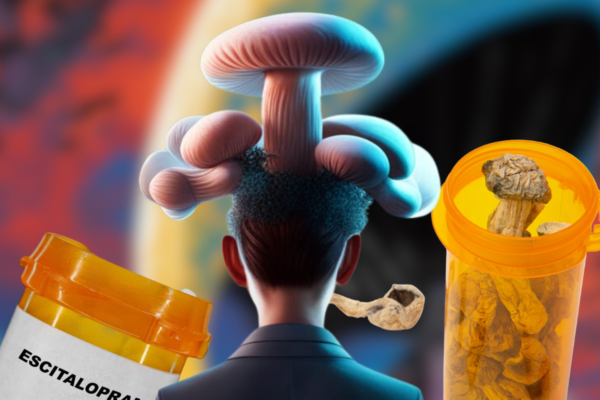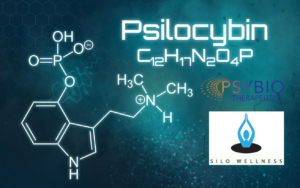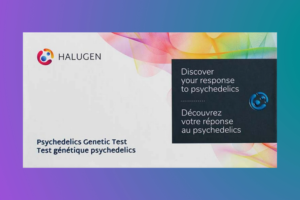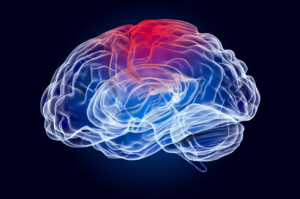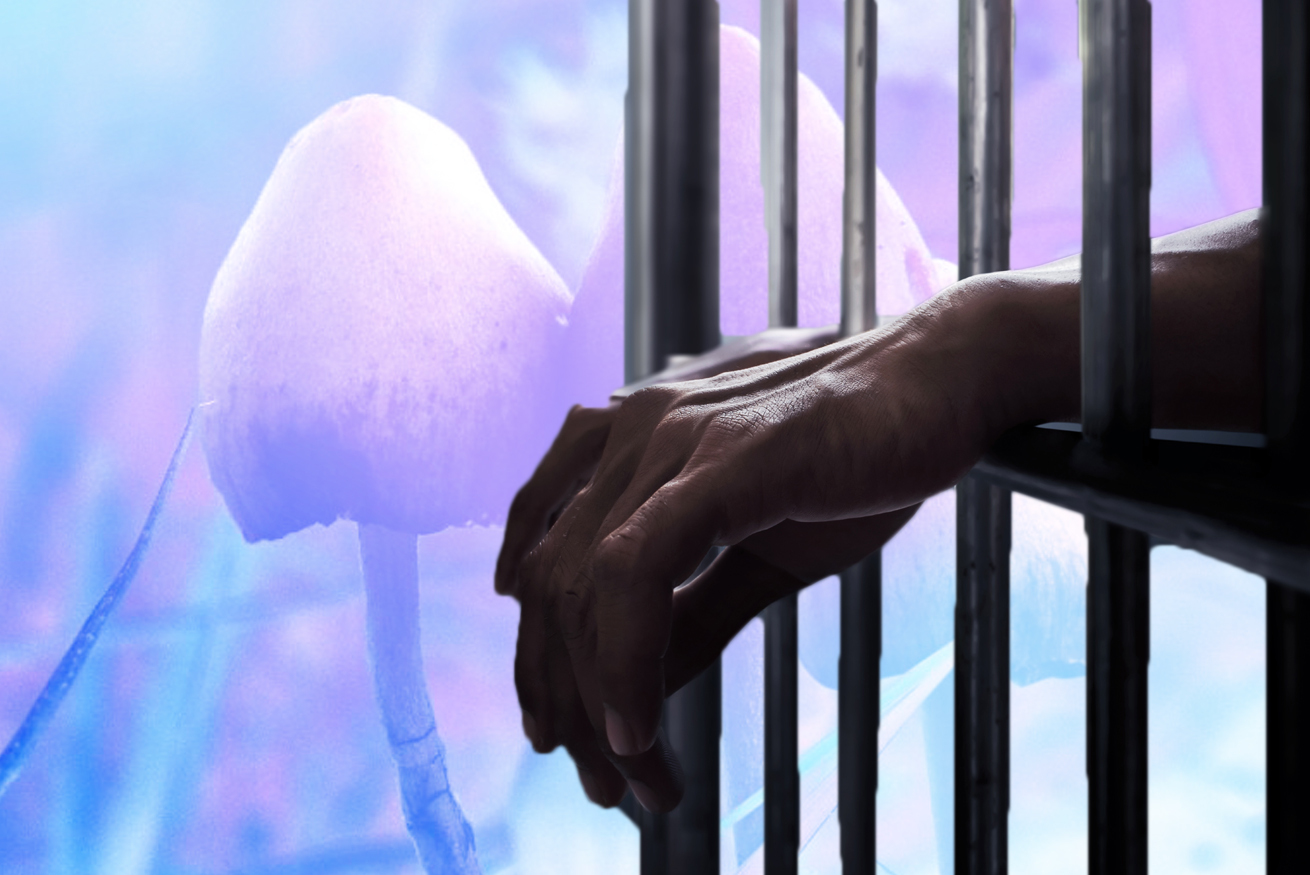
Editor’s Note: As of October 25, 2022, Jessica’s case has been resolved in court. Please see the Editor’s Note at the bottom of this article for the trial outcome.
Between the rise of luxury ayahuasca resorts in Costa Rica, billions of dollars funneled into psychedelic research and development, and bestsellers like Michael Pollan’s How to Change Your Mind, it’s little wonder psychedelics have etched a mark on the collective consciousness. Once the target of smear campaigns and profoundly stigmatized, these mind-altering substances are now prolific in public discourse, with new studies on microdosing psilocybin mushrooms coming out every month. You can almost imagine wandering down to the corner store to grab a packet of magic mushrooms the way you might pick up a pack of tobacco.
Except you can’t. In most places magic mushrooms are still illegal. And even if you grow your own mushrooms, there is still a chance you can end up in prison.
For Jessica Thornton, who has lived with treatment-resistant depression since her senior year at high school, psychedelics represent a lifeline. Thornton, a mom of five and neonatal intensive care nurse, turned to psilocybin after twenty years of taking a smorgasbord of antidepressants with little to no effect. Desperate to find any solution, she tried microdosing psilocybin mushrooms after researching the practice online. However, her experimentation with psilocybin has come at an inconceivable cost. On August 1st, she will appear in court and may be sentenced to up to ten years in prison.
Thornton’s situation is symbolic of the crossroads that characterizes the contemporary psychedelic landscape in the United States. In Michigan, right next door to Indiana where Thornton lives, three cities have decriminalized psychedelics for personal use. Another neighboring state, Illinois, has opened up discussions about statewide psychedelic decriminalization. In Indiana, on the other hand, psychedelics are primarily viewed as illegal, dangerous substances. Those who dare use them risk having their lives upended should they be apprehended. For Thornton, however, microdosing psilocybin mushrooms was a question of life or death.
“I decided to try microdosing psilocybin for depression because nothing else was working for me,” explains Thornton. “I felt as if I was in a constant battle with myself. For the longest time, I felt like a part of me was missing, despite having it all —a good job, a home that was paid for, 5 beautiful children and my health. Eventually, I began having suicidal thoughts and knew I needed to do something about it. I didn’t want my kids to have to cope with the loss of their mother.”
The decision to try psilocybin represented an alternative when it felt like all other avenues had been exhausted. Thornton anchored her choice in evidence for her own peace of mind.
“I did a ton of research online and began listening to podcasts,” she reflects. “I found that Johns Hopkins and other major research universities were doing clinical studies on psilocybin and treatment-resistant depression.”
There’s a growing body of studies documenting the beneficial effects of psilocybin on depression and mood disorders, with new data emerging all the time. For example, one high-profile clinical trial recently concluded that psilocybin offers a “rapid, sustained” antidepressant effect. Moreover, the authors found that there was ‘robust and reliable evidence’ that psilocybin’s antidepressant properties were thanks to its integrative effect on the brain. A brain that functions in a connected, global manner is happier, healthier, and more flexible than a brain constricted by ruminative thinking. In contrast, the study also reported that escitalopram, a conventional SSRI antidepressant, had a milder effect and didn’t elicit those beneficial global brain changes.
Ineffective conventional depression treatments are something Thornton knows only too well.
“I’ve been on many antidepressants: Paxil, Prozac, Celexa, Lexapro, Wellbutrin, Effexor, Abilify, Cymbalta, Trazodone, Remeron, and Pristiq,” says Thornton. “The medications all seemed to make me feel like I was living inside a box. I was seeing a psychiatrist and a psychologist, and at one point, I was admitted to an inpatient psychiatric facility.”
Thornton describes herself as an empath, for whom the deprivation of experiencing emotion was unbearable. “I wasn’t happy, and I wasn’t sad. I was just numb. The meds would also make me drip sweat, feel anxious, and I was unable to orgasm.”
Armed with research and her medical background, Thornton set about developing a careful regimen for microdosing psilocybin mushrooms. In the simplest terms, microdosing means administering sub-hallucinogenic doses of psychedelics. While they may alter mood or perspective, these tiny doses don’t deliver a full-blown trip.
“It took a few months of microdosing 3-4 times a week and titrating to find the right dosage,” says Thornton. “I stacked the psilocybin with Lion’s Mane and niacin. Then one day, after about three months of following this protocol, I found myself examining my surroundings –the cold air of an Indiana winter– and thought to myself, this is a beautiful world after all.”
At that moment, Thornton felt she became liberated from the load she’d been carrying. Released of that burden, she could perceive the beauty and opportunity that had always been there.
“I noticed nature. I felt like I could breathe easily. I remember the feeling that the world could be anything I wanted it to be, and I could achieve my dreams because I didn’t feel the hatred and disgust I had been feeling.”
Psilocybin helped to cast light on what had once been dark. Thornton felt like life was opening itself up to her again, but was conscious that consistency with the microdosing regime might be critical to its success. She needed to find a reliable supply of psilocybin. Given Indiana’s strict stance on controlled substances, magic mushrooms aren’t super easy to come by.
“I decided to grow psilocybin because I didn’t know how else to obtain it,” says Thornton. “I mean, I knew it was illegal. I didn’t realize how illegal it was, though, that it was up there classified as a Schedule I substance. So I sure wasn’t going to go looking anywhere to purchase it –I didn’t want to get in trouble.”
However, as it transpired, growing her own supply of mushrooms was fraught with even more risk. Police confronted her at her Indiana home after a tip-off that she was cultivating a scheduled substance.
“The cops busted my door down, and all pointed their guns at me. You would have thought I had committed a murder,” reflects Thornton, who was charged with two felonies —dealing a scheduled substance and child endangerment. Even though Thornton was not selling magic mushrooms, the law in Indiana requires anyone apprehended with more than 28 grams of fresh or dry mushrooms be charged with a felony for intent to sell. Because she was growing her own fresh mushrooms, the quantity she was apprehended with was over this limit.
“My whole world came crashing down on me just as I was starting to feel better at life. I’ve now lost everything. My children were taken away from me. I have to have supervised visits. My nursing license is on the line, and I don’t know if I can get it back. I don’t know if I’ll be able to get a job again if I’m convicted as a felon.”
The ramifications of these charges run deep. Besides potential jail time and job loss, Thornton is particularly haunted by the threat of being separated from her children and missing out on seeing them grow up.
“I feel like I’m not their mother because I’m not good enough. I had no intention of hurting them. In retrospect I would have gone about it all so differently,” she reflects.
Ironically, while Thornton is steeped in shame with the charge of endangering her children, other parents in the US openly share and support each others’ experiences with psychedelics. Organizations such as Plant Parenthood, for example, provide a supportive space for parents to come together and converse about psychedelics and parenting. In addition, a recent Harper’s Bazaar article, Mommies Who Mushroom, shares stories about moms who consume psychedelics like vitamins. This reality couldn’t be further from the one Jessica is facing and serves to illustrate the profound juxtaposition at play. While some parents feel safe experimenting with psychedelics, others risk losing everything.
At the moment, Thornton is receiving regular ketamine infusions, which are legal in Indiana as they constitute an off-label use of a legal anesthetic. At $500 per session, they don’t come cheap –particularly because in Thornton’s case, they’re only effective for about two weeks. Given the specter of what she is facing, however, they’re helping her manage her depression as she ponders what the future may hold.
“My lawyer told me I would never win a trial. He advised me to plead guilty to the felonies,” says Thornton. “The prosecuting attorney said something like 10 years prison maximum. I’m not sure what’s going to happen and I am so scared. Probation would be a blessing.”
“The thought of being locked up for years, just wasting away –I can be so much more productive than that,” emphasizes Thornton. “I still have so much to offer. I have so many goals and dreams, and I need to raise my children.”
Editor’s Note: As of October 25, 2022, Jessica’s case has been resolved in court. This Psychedelic Spotlight article helped to attract support along with additional legal counsel that helped Jessica build a better case. This was the result of the sentencing based on her revised plea:
“We are happy to report that in presenting the full context of what she was doing and not doing to the prosecutor, along with several expert letters in support, the prosecutor agreed to reduce the charges to a single count of felony possession in a revised plea offer. Jessica accepted the plea agreement and was sentenced on October 25th to 18 months in prison, all suspended, and placed on 18 months probation, 180 days house arrest (with day for day credit for compliance reducing it to 90 days) and an approved treatment program. During her probationary period Jessica will not be speaking publicly about her case. We want to thank all of you for your support, prayers, and understanding.”
